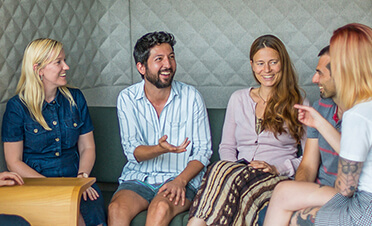Postdoctoral Fellow – Mechanisms for combined RAS-MAPK & DDR inhibition
Postdoctoral Fellow – Mechanisms for combined RAS-MAPK & DDR inhibition
The Discovery Centre, Cambridge Biomedical Campus, Cambridge, UK
Competitive salary and benefits
Introduction to role
Do you have expertise in, and passion for, biological science research and understanding signalling pathways in cancer? Would you like to apply your knowledge to impact drug development in a company that follows the science and turns ideas into life-changing medicines? Then join the Oncology Research and Development (R&D) department at AstraZeneca to unlock the power of what science can do! We have an exciting Postdoctoral research position for a talented biological scientist to explore the potential for combinations of established RAS-MAPK tumour driver and DNA damage response inhibitors for cancer therapy and suppression of drug resistance. This cutting-edge research opportunity will focus on understanding the molecular mechanisms and interplay between activated RAS signalling/inhibition, DDR signalling and anti-tumour immune pathways in RAS-MAPK pathway mutant cancer models.
This is a 3-year programme.
Accountabilities
Novel pre-clinical research by AstraZeneca R&D scientists and other independent published studies have recently implicated the engagement of specific DDR pathways in facilitating the emergence or maintenance of RAS-MAPK pathway inhibitor resistance in tumour models. For example, the combination of mutant-KRAS or -EGFR TDR inhibitors with ATM or ATR DDR inhibitors have demonstrated deeper anti-tumour responses and significantly delayed tumour regrowth compared to single agent treatments. However, the precise mechanisms responsible for these observations remain poorly understood and no systematic studies of different pathways/inhibitors have been conducted to date.
At AstraZeneca we are in a unique position to study this emerging area of biology with our expertise in TDR and DDR biology and an established pipeline of relevant clinical-stage inhibitors. The ultimate aim of this work would be to investigate and gain a better understanding of complex interactions between TDR, DDR and immune signalling in order to identify improved treatments and outcomes for cancer patients. You will be directly supervised by Alan Lau, Principal Scientist in DDR Bioscience team and co-supervised by Sarah Ross, Director in RAS Bioscience team and Alex Koers, Associate Director in RAS in vivo team. You will be embedded and work day-to-day alongside other AstraZeneca research scientists within DDR and RAS biology teams within the OTD Small Molecule Bioscience group in Cambridge, UK. You will also receive expert academic mentorship and guidance from Julian Downward, Principal Group Leader and Miriam Molina-Arcas, Principal Laboratory Research Scientist of the Oncogene Biology Laboratory at The Francis Crick Institute, London, UK.
This is a hands-on, lab-based research role to investigate the mechanisms responsible for the anti-tumour activity of mutant RAS and DDR inhibitor combinations. You will be responsible for designing, performing and interpreting in vitro molecular and cell biology experiments utilising techniques such as cancer cell line culture, growth inhibition assays, drug-drug combinations, western blotting, immunofluorescence, flow cytometry, cytokine/ELISA, gene expression, CRISPR-Cas9 gene editing and analysis of RAS-, DDR-, immunogenic cell death (ICD-) and interferon (IFN-) signalling pathways. You may be involved in ex vivo tumour pharmacodynamic (PD) and immune cell analysis, and familiarity with in vivo procedures would be desirable but not essential. You will be part of and will work collaboratively with other members of the RAS biology, DDR biology and in vivo teams. You will have ample opportunities to present your work internally within AstraZeneca, externally at academic conferences and publish one or more papers in high quality scientific journals.
Essential Skills/Experience
- PhD (or equivalent) in cancer biology
- Experience in at least one area related to RAS-MAPK, DDR or immune-oncology biological research
- Expertise in established in vitro cell and molecular biology techniques such cancer cell line culture, growth inhibition assays, protein and gene expression analysis
- Self-motivated with the ability to work independently for the design, execution and interpretation of experiments/data but equally able to work collaboratively as part of multidisciplinary teams
- Good communication skills, with fluent written and spoken English
- Our Postdoc programme is aimed at individuals with a strong publication record who are either:
- Within 4-years of obtaining their doctoral degree (PhD, DVM, or MD) - PhD already awarded, or
- Students, soon to obtain doctoral degrees (the PhD must be awarded within 6 months of joining AstraZeneca)
Desirable Skills/Experience
- Experience with molecular cloning, transfection/transduction, siRNA knockdown, CRISPR-Cas9 gene editing, immunofluorescence, flow cytometry, cell cycle analyses
- Experience with small molecule inhibitors, drug-drug-combinations, cell co-culture and/or cytokine profiling
- Experience with bulk/single-cell RNA-seq and transcriptomics analyses and/or CyTOF mass cytometry immuno-phenotyping analyses
- Familiarity with in vivo experiments and/or ex vivo tumour/immune pharmacodynamic profiling
- A scientific track-record, as evidenced by published or accepted papers in peer-reviewed journals, oral or poster presentations at scientific meetings
- Innovative and data driven, with an ability to think “outside-of-the-box” and challenge established scientific dogma
At AstraZeneca, we follow the science to pioneer new frontiers. Our team is dedicated to Oncology with an ambition to eliminate cancer as a cause of death. With multiple indications and high-quality molecules at all stages of our innovative pipeline, we keep pushing forward. We fuse cutting-edge science with the latest technology to achieve breakthroughs. Backed by investment, we aim to deliver twenty new molecular entities by 2030.
Our environment is built on courage, curiosity, and collaboration. We make bold decisions driven by patient outcomes. Empowered to lead at every level, we ask questions and take smart risks that write the next chapter for our pipeline and Oncology team. As pioneers of collaborative research, we have built an unrivalled scientific community both internally and externally. By fusing academia and industry, we have united some of the world's foremost medical centres. Working seamlessly together, we expedite research in some of the hardest-to-treat cancers.
Join us on this journey to improve the lives of millions with cancer! Apply now!
AstraZeneca embraces diversity and equality of opportunity. We are committed to building an inclusive and diverse team representing all backgrounds, with as wide a range of perspectives as possible, and harnessing industry-leading skills. We believe that the more inclusive we are, the better our work will be. We welcome and consider applications to join our team from all qualified candidates, regardless of their characteristics. We comply with all applicable laws and regulations on non-discrimination in employment (and recruitment), as well as work authorization and employment eligibility verification requirements.




